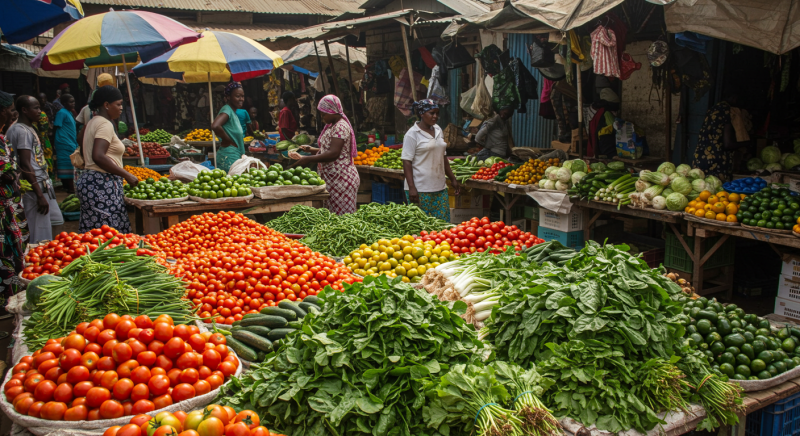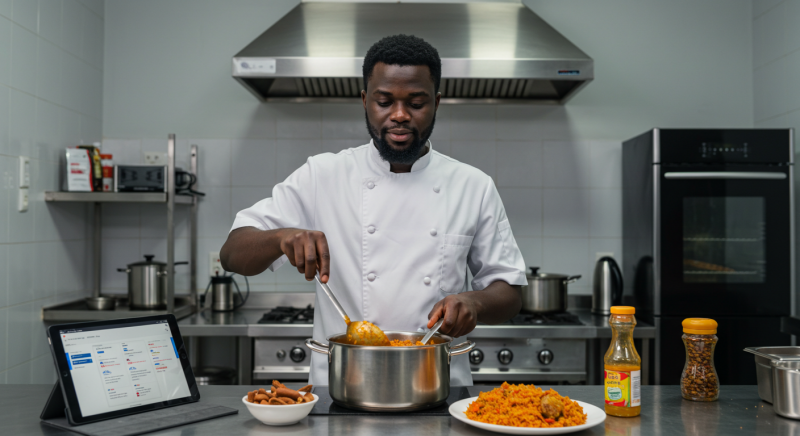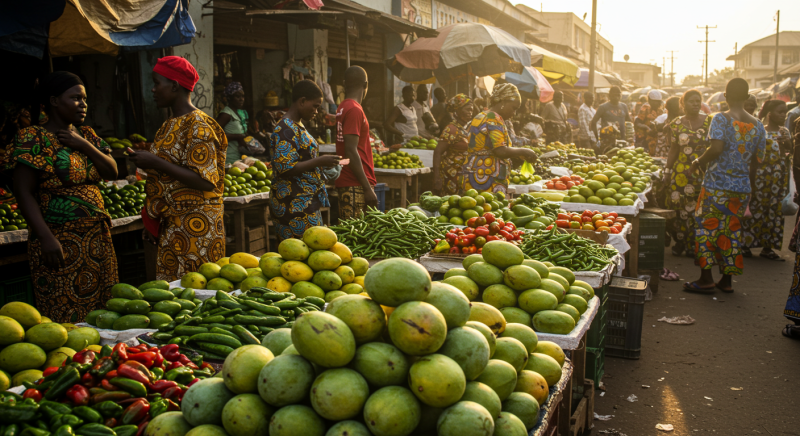What Separates Successful Nigerian Food Startups from Those That Struggle to Secure Funding?
Nigeria’s food and beverage sector is booming, driven by urbanization, tech adoption, and a young, dynamic population. Yet, while startups like Vendease (33million raised) and Cold Hubs1.5 million from USAID) have attracted significant investment, many others falter at the pitching stage. The difference often lies in preparation, differentiation, and understanding investor priorities. In this guide, we explore how to craft a winning pitch for food and beverage startups in Nigeria, backed by market trends, statistical insights, and actionable strategies.
Key Takeaways
-
Market Potential: Nigeria’s food sector is projected to grow at 7% annually, fueled by urbanization and digital adoption.
-
Differentiation Matters: Investors prioritize startups with unique value propositions, such as innovative packaging, tech-driven logistics, or niche cuisines.
-
Data-Driven Pitches: Metrics like gross margins (40–60% ideal), customer acquisition costs, and repeat purchase rates are critical.
-
Regulatory Readiness: Compliance with NAFDAC, SON, and CAC standards builds investor confidence.
-
Scalability: Demonstrate how your startup can scale to $100 million in revenue, a key benchmark for venture capital firms.

The Nigerian Food and Beverage Landscape: Why Investors Are Paying Attention
Nigeria’s food and beverage sector is no longer just a local market—it’s a global investment hotspot. With a population of 220 million (70% under 35) and urbanization rates climbing to 52%, the country’s appetite for innovative dining, tech-driven delivery, and sustainable food solutions is reshaping the economy. Investors pouring $118 million into the sector since 2020 aren’t just chasing trends; they’re capitalizing on a perfect storm of demographic shifts, policy reforms, and digital disruption. Here’s why pitching to investors for food and beverage startups in Nigeria has become a high-stakes opportunity and how to position your venture in this booming landscape.
Demographic Goldmine: Africa’s Largest Consumer Base
Nigeria’s youthful population isn’t just growing—it’s evolving. Over 45 million Nigerians now earn between 500–1,500 monthly (Brookings Institution), creating a middle class eager to spend on convenience and quality. For instance:
-
Quick-service restaurants (QSRs) like Chicken Republic and Sweet Sensation grew revenue by 18% annually by targeting urban professionals.
-
Health-conscious millennials drive demand for organic products, with brands like Farmcrowdy and ReelFruit securing funding for nutrient-dense snacks.
Investors are particularly drawn to startups addressing underserved niches. Take EatN’Go (Domino’s Pizza franchisee), which raised 12millionbytappingintoNigeria’s2.1 billion QSR market. When pitching to investors for food and beverage startups in Nigeria, emphasize how your solution aligns with these demographic shifts—whether through premiumization, affordability, or convenience.
Tech-Driven Disruption: The Rise of Agritech and Delivery Platforms
Nigeria’s food sector is leapfrogging traditional retail models. With 48% internet penetration and 15 million active e-commerce users (Statista), startups blending food and tech are winning big:
-
Agritech platforms: Releaf’s $4.2 million seed round (2023) for palm oil processing tech highlights investor appetite for supply chain innovation.
-
Delivery apps: Food delivery grew 25% YoY, with Chowdeck processing 500,000+ monthly orders across Lagos and Abuja.
For investors, scalability is non-negotiable. A startup like Vendease attracted $33 million by digitizing bulk food procurement for restaurants, reducing costs by 30%. When pitching to investors for food and beverage startups in Nigeria, showcase how your tech stack—whether AI-driven inventory tools or IoT-enabled cold storage—solves systemic inefficiencies.
Policy Tailwinds: Government and Regulatory Shifts
Recent reforms are smoothing the path for food entrepreneurs:
-
NAFDI Act 2023: Tax breaks for agritech startups using local raw materials.
-
CBN’s RT200 Scheme: Subsidies for export-focused F&B businesses.
-
State-level grants: Lagos State’s N5 billion fund for SMEs in food processing.
Compliance also builds trust. Startups like Kereksuk Rice (sustainable rice farming) secured $2.1 million by preemptively aligning with NAFDAC and SON standards. When pitching to investors for food and beverage startups in Nigeria, highlight certifications and partnerships (e.g., collaborations with the National Agricultural Seed Council) to mitigate perceived regulatory risks.
Market Gaps: Where Opportunity Meets Urgency
Despite growth, critical gaps remain—each a potential goldmine for savvy founders:
-
Food waste: Nigeria loses 10billion annually to post−harvest losses(FAO). Startups like ColdHubs (solar cold storage) turned this crisis into a 1.5 million funding opportunity.
-
Nutritional deficits: 37% of children under five suffer stunting (UNICEF). Sahel Consulting’s $4 million-backed biofortified crops project exemplifies impact-driven investing.
-
Import dependency: Nigeria spends $10 billion yearly on food imports. Investors are backing local alternatives like Canaan Farms (soybean-based meat substitutes).
Case Study: How Shonga Farms Leveraged the Landscape to Secure $10 Million
In 2022, Kwara State-based Shonga Farms closed a landmark deal with Afreximbank by aligning its pitch with national priorities:
-
Local sourcing: 80% of inputs from Nigerian farmers.
-
Export focus: Targeting $2 million in annual exports to ECOWAS markets.
-
Job creation: 1,200 direct jobs in a region with 35% youth unemployment.
Their success underscores a key lesson: When pitching to investors for food and beverage startups in Nigeria, frame your venture as a solution to macroeconomic challenges like import substitution or employment.
Competitive Edge: Standing Out in a Crowded Market
Investors see hundreds of pitches monthly. To stand out:
-
Leverage cultural relevance: Erisco Foods (tomato paste giant) built a $300 million valuation by adapting recipes to local tastes.
-
Prove unit economics: Lagos-based Bamboo (cloud kitchen) achieved 55% gross margins by optimizing meal prep costs.
-
Highlight ESG alignment: Babban Gona raised $10 million for its climate-smart maize farming model.
The Investor Mindset: What They’re Really Looking For
Interviews with Lagos-based VC firms reveal three priorities:
-
Scalability: Can you expand beyond Lagos/Abuja?
-
Margin resilience: How will you maintain 40%+ margins amid inflation?
-
Exit potential: Are multinationals like Nestlé or Promasidor likely acquisition partners?
When pitching to investors for food and beverage startups in Nigeria, address these questions head-on. For example, Omniretail (B2B food distribution) mapped a 5-year plan to capture 15% of Nigeria’s retail market, leading to a $2.5 million pre-Series A round.
Conclusion: Positioning Your Startup in Nigeria’s Food Revolution
The Nigerian food and beverage sector offers unparalleled opportunities—but only for founders who understand its complexities. By combining cultural insights, tech innovation, and regulatory savvy, your pitch can transform from a business proposal into a compelling narrative of national transformation. As investor interest peaks, startups that articulate clear solutions to Nigeria’s food challenges will dominate the funding landscape.

Crafting an Irresistible Pitch: 5 Pillars for Success
1. Start with a Compelling Story
Investors don’t just fund ideas—they fund visionaries. Begin your pitch with a narrative that highlights your startup’s mission. For example, SendMe uses AI to address Nigeria’s protein deficit, linking social impact with profitability. Stories resonate emotionally, but they must be grounded in data.
Example:
*“In a country where 37% of children under five suffer from malnutrition, our meal kits provide affordable, nutrient-rich options for low-income families—delivered via a subscription model with 80% monthly retention.”*
2. Prove Traction with Hard Data
Early-stage investors in Nigeria increasingly demand proof of market validation. If you’re pre-revenue, focus on pilot programs or partnerships. For revenue-generating startups, emphasize:
-
Gross Margins: Aim for 40–60% (industry benchmark for scalable F&B businesses).
-
Customer Acquisition Cost (CAC): Compare favorably to customer lifetime value (LTV).
-
Repeat Purchase Rate: 30%+ indicates strong brand loyalty.
Vendease, a B2B food marketplace, leveraged its $33 million debt financing round by showcasing a 200% year-on-year growth in order volume and partnerships with 500+ restaurants.
3. Highlight Distribution Mastery
Nigeria’s fragmented supply chain is a major hurdle. Investors want to see innovative distribution strategies. For instance:
-
Cloud Kitchens: Reduce overhead costs by 40% compared to traditional restaurants.
-
Last-Mile Delivery: Partner with logistics platforms like GIG Logistics to ensure timely deliveries.
-
E-Commerce Integration: Platforms like Jumia and Konga account for 15% of food sales in Lagos.
Star Kitchens, a cloud-based restaurant software, raised $4.5 million by demonstrating how its tools help vendors optimize delivery routes and reduce spoilage.
4. Address Risks Proactively
Investors scrutinize risks like supply chain disruptions, regulatory hurdles, and currency volatility. Mitigate concerns by:
-
Diversifying Suppliers: Partner with local farmers and international vendors.
-
Securing Licenses: NAFDAC certification is non-negotiable for food businesses.
-
Hedging Forex Risks: Use forward contracts to stabilize import costs.
5. Showcase a Stellar Team
A skilled team is often the deciding factor. Highlight advisors with industry experience—e.g., a CFO who scaled a startup to exit or a chef with Michelin-star credentials. ColdHubs’ CEO, Nnaemeka Ikegwuonu, leveraged his agritech background to secure USAID funding.
Financial Modeling: Turning Projections into Confidence When Pitching to Investors for Food and Beverage Startups in Nigeria
When pitching to investors for food and beverage startups in Nigeria, a robust financial model isn’t just a spreadsheet—it’s the backbone of your credibility. Investors want to see a clear path to profitability, especially in a market as dynamic and competitive as Nigeria’s F&B sector. With rising inflation (33.95% as of May 2024, per the National Bureau of Statistics) and fluctuating consumer spending, your financial assumptions must reflect both ambition and realism. Here’s how to craft a financial narrative that turns projections into investor confidence.
Why Financial Modeling Matters for Nigerian Food Startups
Nigeria’s food industry is ripe with opportunities but fraught with challenges like supply chain bottlenecks and currency volatility. A well-structured financial model demonstrates that you’ve anticipated these hurdles and built mitigations into your strategy. For instance, investors evaluating a pitch for a Lagos-based cloud kitchen will scrutinize:
-
Break-even timelines: How quickly can the business offset startup costs?
-
Burn rate efficiency: Is the startup stretching every naira?
-
Scalability: Can the model support expansion to cities like Abuja or Port Harcourt?
Startups like Vendease, which raised $33 million by showcasing a 200% YoY growth in order volume, used financial models to prove their unit economics (e.g., cost per meal, delivery margins). Similarly, ColdHubs highlighted a 90% reduction in post-harvest losses—a metric directly tied to revenue growth—in their investor pitch.
Key Components of a Winning Financial Model
1. Revenue Projections Grounded in Market Realities
Avoid generic templates. Tailor your revenue forecasts to Nigeria’s unique demographics. For example:
-
A food delivery startup in Lagos could model revenue based on the city’s 15 million residents, 52% urbanization rate, and average household spending on food (23% of income, per NBS).
-
A café targeting Abuja’s middle class might factor in premium pricing (e.g., ₦2,500 per coffee vs. ₦800 at local bukas) and foot traffic near business districts.
Use tools like Google Trends (to gauge demand for “plant-based meals” or “healthy snacks”) and Statista (for sector growth rates) to validate assumptions.
2. Cost Structures That Reflect Local Challenges
Nigeria’s infrastructure gaps mean higher operational costs. Your model must account for:
-
Generator-dependent operations: Fuel costs can consume 20–30% of monthly expenses.
-
Import tariffs: Equipment like industrial ovens or packaging machines may incur 25–35% duties.
-
Staffing: Include training costs for skilled labor, which is scarce in niche areas like pastry arts.
Pro Tip: Use historical data from similar businesses. For example, cloud kitchens in Ibadan report 40% lower overhead than traditional restaurants due to shared utilities.
3. Scenario Analysis: Preparing for the Unexpected
Investors want to see how your startup will navigate risks like:
-
Naira depreciation: Model forex impacts if you import ingredients.
-
Regulatory changes: Estimate costs of new labeling laws or safety audits.
-
Competitor pricing wars: Simulate revenue drops if a rival undercuts your prices by 15%.
Include best-case, worst-case, and base-case scenarios. For instance, a plant-based snack company could show how a 20% rise in soybean prices would affect gross margins.
Case Study: How Chowdeck’s Financial Model Secured $1 Million in Pre-Seed Funding
Lagos-based delivery platform Chowdeck (active in 12 cities) attracted early-stage investors by:
-
Linking customer acquisition costs to lifetime value: Their CAC of ₦1,200 per user was offset by an LTV of ₦8,500 (6:1 ratio).
-
Highlighting asset-light scalability: Partnering with existing restaurants reduced capital expenditure by 60%.
-
Forecasting regional expansion: A phased rollout to Enugu and Kano showed 35% projected revenue growth from untapped markets.
This granular approach reassured investors of Chowdeck’s potential to dominate Nigeria’s $3 billion food delivery space.
Tools to Build Investor-Ready Financial Models
-
Excel/Google Sheets: Ideal for basic models. Use templates from platforms like Corporate Finance Institute.
-
PitchBoard: A Lagos-based startup tool that automates financial projections for Nigerian markets.
-
Industry Benchmarks: Compare your metrics to local standards—e.g., QSRs (quick-service restaurants) aim for 50% gross margins.
Common Pitfalls to Avoid When Pitching to Investors for Food and Beverage Startups in Nigeria
-
Overestimating market share: Claiming you’ll capture 30% of Lagos’ burger market in Year 1 is unrealistic.
-
Ignoring seasonality: December sales spikes (holiday catering) and Ramadan-driven demand require separate modeling.
-
Underfunding contingency plans: Allocate 10–15% of your budget for unforeseen costs like fuel shortages.
By aligning your financial model with Nigeria’s economic realities—and rigorously testing every assumption—you transform spreadsheets into a compelling story of growth. Whether you’re pitching a jollof rice subscription service or a tech-driven farm-to-table platform, investors need to see that you’ve mastered the numbers behind the vision.
Regulatory Compliance: Building Trust with Investors
Why Compliance Matters in Nigeria’s F&B Sector
Nigeria’s regulatory framework is rigorous but navigable. For investors, compliance reduces risks like:
-
Product recalls: Non-NAFDAC-approved goods face immediate seizure, costing startups an average of ₦50 million per incident.
-
Legal disputes: 30% of food businesses in Lagos have faced lawsuits over labeling or safety violations (Lagos State Consumer Protection Agency).
-
Reputation damage: A 2023 scandal involving a popular juice brand’s unlicensed additives led to a 70% sales drop.
Investors like Ventures Platform and GreenTec Capital explicitly seek startups with full certifications, viewing them as lower-risk bets. For example, ReelFruit, a dried fruit producer, secured $3 million in Series A funding after showcasing NAFDAC and SON certifications, which enabled export deals with Whole Foods.
Key Regulatory Requirements for Food Startups
1. NAFDAC Registration: The Gateway to Market Legitimacy
The National Agency for Food and Drug Administration and Control (NAFDAC) regulates all food products sold in Nigeria. The process involves:
-
Product listing: Submit ingredient lists, nutritional facts, and manufacturing processes.
-
Facility inspection: NAFDAC officials assess hygiene, storage, and equipment.
-
Laboratory testing: Products undergo safety checks for contaminants like aflatoxins.
Cost: ₦150,000–₦500,000, depending on product complexity.
Timeline: 90–120 days.
Startups like Farmcrowdy accelerated approvals by hiring NAFDAC-licensed consultants to streamline documentation. When pitching to investors for food and beverage startups in Nigeria, include your NAFDAC status in the “Traction” slide—it’s a tangible milestone.
2. SON Certification: Quality as a Differentiator
The Standards Organization of Nigeria (SON) enforces quality benchmarks, especially for packaged goods. Key focus areas:
-
Labeling: Ingredients, expiry dates, and nutritional info in clear English.
-
Packaging: Food-grade materials resistant to humidity and pests.
-
Metric measurements: Weight/volume must align with stated values.
Case Study: Ojatee Consulting helped Erisco Foods (tomato paste giant) achieve SON certification, which became a selling point for its $300 million valuation. Investors often cite SON compliance as proof of “investment readiness.”
3. CAC Incorporation: Structuring for Equity Deals
The Corporate Affairs Commission (CAC) legally recognizes your business. For equity-seeking startups, a CAC-registered entity is non-negotiable. Investors require:
-
Share structure: Clear equity distribution among founders.
-
Tax compliance: Up-to-date FIRS filings.
-
IP protection: Trademarks for brand names or recipes.
Lagos-based Eat Drink Lagos (food festival) leveraged CAC registration to secure $500,000 from Heirs Holdings, as it clarified ownership stakes for future exits.
Proactive Compliance: Strategies to Impress Investors
1. Preempt “Silent” Regulations
Nigeria’s regulatory landscape evolves rapidly. For instance, 2024’s Sugar Tax (₦10 per liter on sugary drinks) impacted beverage startups like Chi Limited. Stay ahead by:
-
Monitoring FMAN (Federal Ministry of Agriculture) policy drafts.
-
Joining industry groups like the Nigerian Association of Small-Scale Industrialists (NASSI) for updates.
2. Leverage Tech for Compliance Management
Tools like ComplyNG (a Lagos-based SaaS platform) automate license renewals and audit trails, reducing human error. Kippa’s accounting software also helps track tax obligations.
3. Showcase Compliance in Your Pitch Deck
Dedicate a slide to:
-
Certification timelines: “NAFDAC approval secured in Q3 2024.”
-
Advisory board: List consultants or lawyers specializing in food law.
-
Risk mitigation: “We’ve allocated 5% of seed funding to compliance.”
When pitching to investors for food and beverage startups in Nigeria, highlight partnerships with regulators. For example, ColdHubs collaborated with the National Horticultural Research Institute to certify its solar cold storage units, easing due diligence for USAID.
Common Pitfalls to Avoid
-
Ignoring local regulations: A foreign-backed bakery in Abuja failed after using non-SON-approved flour preservatives.
-
Underbudgeting: Allocate at least 10% of pre-seed funds to compliance.
-
Expired licenses: Renew NAFDAC certifications annually—lapses trigger penalties up to ₦1 million.
Compliance as a Catalyst for Funding
When pitching to investors for food and beverage startups in Nigeria, regulatory compliance isn’t just about avoiding fines—it’s about proving your startup’s longevity and scalability. By embedding compliance into your operational DNA, you signal to investors that you’re prepared to navigate Nigeria’s complex business environment and deliver returns. As the sector grows, startups that master this balance will dominate the funding landscape.
Case Studies: Lessons from Nigerian Success Stories
-
ColdHubs: Raised $1.5 million by addressing post-harvest losses with solar-powered cold storage. Their pitch emphasized a 90% reduction in spoilage for farmers.
-
Vendease: Secured $33 million by digitizing Africa’s food supply chain, showcasing a 300% ROI for restaurant partners.
-
So Fresh: Dominates Lagos’ health-food market with a subscription model, achieving 50% gross margins through premium pricing.

FAQs: Answering Critical Investor Questions
Q: How much equity should I offer investors?
A: Typically, 10–25% for seed rounds, depending on valuation. Use platforms like F6S to benchmark.
Q: Which investors focus on Nigerian F&B startups?
A: Ventures Platform, GreenTec Capital, and LoftyInc Capital are active in the sector.
Q: How do I validate my market size?
A: Use data from the National Bureau of Statistics and industry reports by PwC or KPMG.
Conclusion: Turning Vision into Investment
Pitching to investors for food and beverage startups in Nigeria requires a blend of storytelling, data, and strategic foresight. By emphasizing scalability, regulatory readiness, and financial discipline, entrepreneurs can unlock the funding needed to transform Nigeria’s food landscape. As the sector evolves, startups that solve real problems—whether through tech-driven logistics or niche products—will continue to attract capital.
READ MORE
Discover Scholarships That Fit Your Goals and Needs
External Sources:
